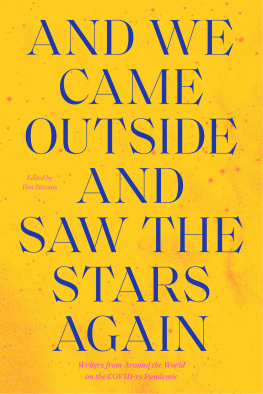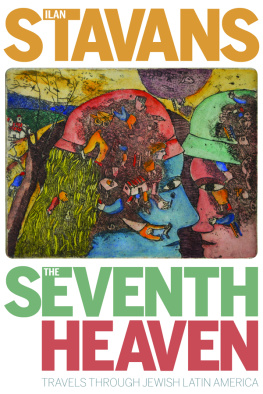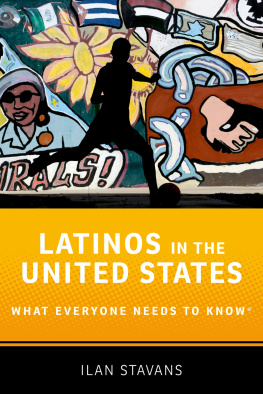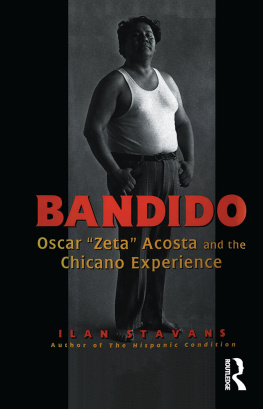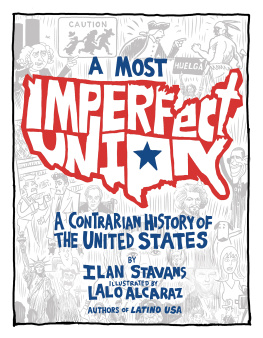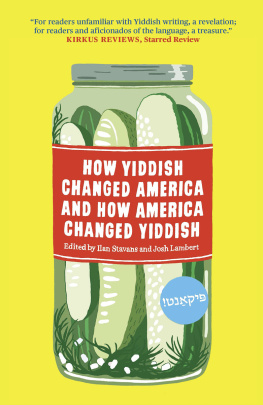Ilan Stavans - And We Came Outside and Saw the Stars Again
Here you can read online Ilan Stavans - And We Came Outside and Saw the Stars Again full text of the book (entire story) in english for free. Download pdf and epub, get meaning, cover and reviews about this ebook. year: 2020, genre: Art. Description of the work, (preface) as well as reviews are available. Best literature library LitArk.com created for fans of good reading and offers a wide selection of genres:
Romance novel
Science fiction
Adventure
Detective
Science
History
Home and family
Prose
Art
Politics
Computer
Non-fiction
Religion
Business
Children
Humor
Choose a favorite category and find really read worthwhile books. Enjoy immersion in the world of imagination, feel the emotions of the characters or learn something new for yourself, make an fascinating discovery.
- Book:And We Came Outside and Saw the Stars Again
- Author:
- Genre:
- Year:2020
- Rating:3 / 5
- Favourites:Add to favourites
- Your mark:
- 60
- 1
- 2
- 3
- 4
- 5
And We Came Outside and Saw the Stars Again: summary, description and annotation
We offer to read an annotation, description, summary or preface (depends on what the author of the book "And We Came Outside and Saw the Stars Again" wrote himself). If you haven't found the necessary information about the book — write in the comments, we will try to find it.
And We Came Outside and Saw the Stars Again — read online for free the complete book (whole text) full work
Below is the text of the book, divided by pages. System saving the place of the last page read, allows you to conveniently read the book "And We Came Outside and Saw the Stars Again" online for free, without having to search again every time where you left off. Put a bookmark, and you can go to the page where you finished reading at any time.
Font size:
Interval:
Bookmark:



For
Madeline Kripke (19432020),
doyenne of dictionaries;
Eavan Boland (19442020),
poet of disruptions;
and
Frederika Randall (19482020),
translator of the unsaid.
To show you how the world begins again:
One word at a time.
One woman to another.
Eavan Boland,
Ode to Grace Murray Hopper (2001)
- Shenaz Patel Mauritius
- translated by Lisa Ducasse
- Jhumpa Lahiri United States / Italy
- translated by Alta L. Price
- Mario Vargas Llosa Peru
- translated by Samuel Rutter
- Daniel Halpern United States
- Hubert Haddad Tunisia / France
- translated by Jeffrey Zuckerman
- Javier Sinay Argentina
- translated by Robert Croll
- Rajiv Mohabir United States / Guyana
- Mona Kareem Kuwait / United States
- Filip Springer Poland
- translated by Sean Gasper Bye
- Teresa Solana Spain
- translated by Peter Bush
- Naivo Madagascar
- translated by Allison M. Charette
- Frederika Randall United States / Italy
- Khalid Albaih Sudan
- Hamid Ismailov Uzbekistan
- translated by Shelley Fairweather-Vega
- Andrs Neuman Argentina / Spain
- translated by Ilan Stavans
- Nadia Christidi Lebanon
- Lynne Tillman United States
- Maxim Osipov Russia
- translated by Boris Dralyuk
- Jane Hirshfield United States
- Gyrgy Spir Hungary
- translated by Bernard Adams
- Rivka Galchen Canada / United States
- Forrest Gander United States
- Lilya Kalaus Kazakhstan
- translated by Shelley Fairweather-Vega
- Gabriela Wiener Peru
- translated by Jessica Powell
- Jon Lee Anderson and Ilan Stavans
United States and Mexico - Louis-Philippe Dalembert Haiti
- translated by Ghjulia Romiti
- Priyanka Champaneri United States
- Ariel Dorfman Chile
- Juan Villoro Mexico
- translated by Charlotte Coombe
- Ana Simo United States
- Francine Prose United States
- Majed Abusalama Palestine
- Pedro ngel Palou Mexico
- translated by Hebe Powell
- Chloe Aridjis Mexico / United Kingdom
- Wu Ming-Yi Taiwan
- translated by Jenna Tang
- Eko Mexico
- Andr Naffis-Sahely Italy / United Arab Emirates
- Yishai Sarid Israel
- translated by Ronnie Hope
- Claire Messud United States
- Matthew Zapruder United States
- Gbor T. Sznt Hungary
- translated by Paul Olchvry
- Sayed Kashua Palestinian citizen of Israel
- translated by Mitch Ginsburg
- Arshia Sattar India
- Carlos Fonseca Costa Rica / Puerto Rico
- Eavan Boland Ireland
- Eduardo Halfon Guatemala
- Grace Talusan Philippines / United States
- Daniel Alarcn Peru
- translated by Ilan Stavans
- Chris Abani Nigeria / United States
- Yoss Cuba
- translated by David Frye
- Giacomo Sartori Italy
- translated by Frederika Randall
Unprecedented was the ubiquitous term first used to describe the COVID-19 pandemic that swept the world in 2020, as if the event were unlike any other. The truth is that it has been rather routine in its procedure, part of the eternal cycles of nature. Even in the Bible, similar disastersearthquakes, deluges, famines, plagues of insects, pestilence of livestock, boils, thunderstorms of hail and fireare recurrent visitors in the theater of human affairs. Which doesnt mean, of course, that new calamities such as this one arent extraordinary.
It isnt surprising that the official approach to the pandemic was initially forensic, with an insistence on numbers: how many deaths and infections per day in a given hospital of a given city in a given country, how long a possible vaccine could take to bring us all out of purgatory, and so on, as if suffering could be quantified, ignoring that each and every person lost was unique and irreplaceable. The Talmud says that death is a kind of sleep and that one persons sleep is unknowable to others.
Although the misfortune arrived at a time when the essential tenets of globalism were being questionedtariffs imposed, borders closed, immigrants seen with suspicionthe pandemic was planetary, hitting wherever people did what people do. It preyed with distinct fury on the poor and vulnerable, as natural catastrophes always do, especially in countries ruled by tyrants responding with disdain and hubris.
Inevitably, the lockdown also forced a new method to everything everywhere. The sound of the kitchen clock suddenly felt new, the warmth of a handshake, the taste of fresh soup. As an antidote to numbers, it was once again left to writers to notice those changes, to chronicle them by interweaving words. Thats what literature does well: it champions nuance while resisting the easy tricks of generalization. This international anthology includes over fifty of those writers representing thirty-five countries and arriving in about a dozen languages. Cumulatively, their accounts are proof of the degree to which COVID-19 brought about the collapse of a hierarchy of principles we had all embraced until then. Call it the end of an era.
Shenaz Patel, from Mauritius, for instance, realizes that suddenly, like an octopus disturbed in its sleep, everything kept hidden under the placid surface latched onto us with its many arms and spit its ink into our faces. She adds: We are faced with a true civil war of speech, echoing through radios and social media, between those who respect the lockdown and those who dont; those who understand and the cocovids , the empty heads who go out anyway; between the true patriots and the selfish few who knowingly put others in danger. Patel continues: Trying to disguise the fact that the lockdown will be experienced differently by all, depending on whether one lives in a spacious house with a garden and pool, or with a family of six in a ramshackle shack and a bank account that doesnt need a pandemic to see its curve flatten. Deaf to the screaming paradox that we create by demanding that those whom our neoliberalist policies have exploited and crushed for years help us save our own skin.
For Maxim Osipov, from Tarusa, Russia, the concern over the elderly masks other fears. He writes of a man who began telling anyone who would listen that he was worried about his mother. What else would he be worried about? No sense in thinking of the children (they werent vulnerable), his wife was eleven years younger than him, and, needless to say, he wasnt concerned about himself. Do the math: what were the chances of him croaking? One percent, maybe one point five. A real man doesnt lose his head over trifles. If I die in a combat zone, box me up and ship me home Oh, speaking of, hed prefer to be crematedeveryone clear on that? People had always told him he had a pleasant voice, and now he was growing convinced of it. He kept singing and singingvigorous, patriotic songs. Hed have loved to sing democratic ones, but there just werent any. A nervous reaction? Maybe. But it was his mother he was worried about, not himself.
The need to recalibrate, to use the pandemic as a new beginning, or at least to try to, is clear to Francine Prose, from New York. I always hope that crises will make me more compassionate and less irritable, she posits, but its rarely the case. I suppose it would help if I stopped watching the evening news. It cant be healthy to yell at the TV for the entire White House press conference. And how can the newscasters keep telling us that Were all in this together, when, in so many important ways, we have never been more alone?
Font size:
Interval:
Bookmark:
Similar books «And We Came Outside and Saw the Stars Again»
Look at similar books to And We Came Outside and Saw the Stars Again. We have selected literature similar in name and meaning in the hope of providing readers with more options to find new, interesting, not yet read works.
Discussion, reviews of the book And We Came Outside and Saw the Stars Again and just readers' own opinions. Leave your comments, write what you think about the work, its meaning or the main characters. Specify what exactly you liked and what you didn't like, and why you think so.

